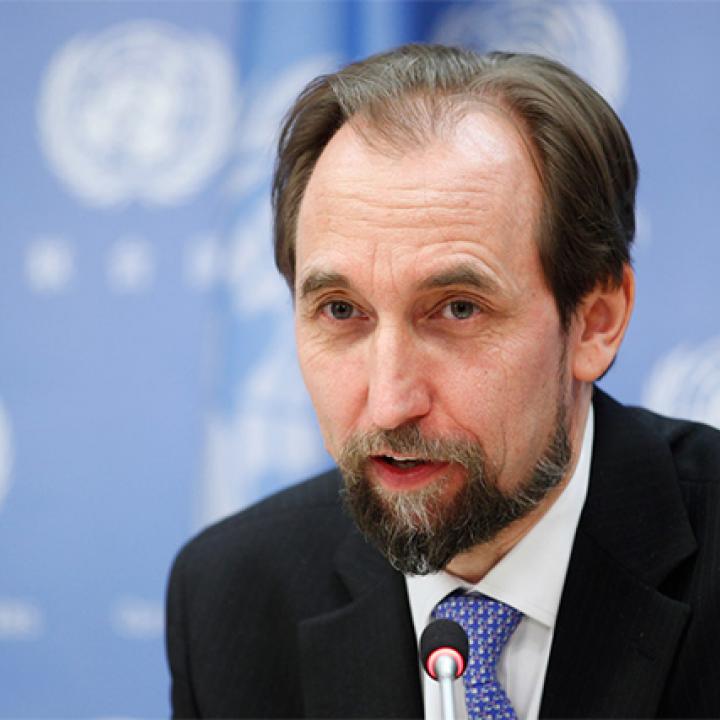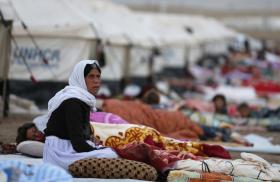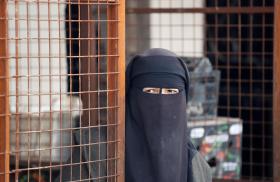
- Policy Analysis
- PolicyWatch 2349
The Battle of Ideas 2.0: Combating ISIS Ideology at Home and Abroad

Part of a series: Counterterrorism Lecture Series
or see Part 1: U.S. Efforts against Terrorism Financing: A View from the Private Sector
An in-depth conversation on the challenges of battling jihadist ideology in the ISIS era.
On December 16, His Royal Highness Prince Zeid Ra'ad al-Hussein of Jordan, Matthew Levitt, and Hedieh Mirahmadi addressed a Policy Forum at The Washington Institute. HRH Prince Zeid is the UN high commissioner for human rights. Levitt is the Institute's Fromer-Wexler Fellow and director of the Stein Program on Counterterrorism and Intelligence. Mirahmadi is the director of World Organization for Resource Development and Education (WORDE), a nonprofit dedicated to preventing radicalization. The following is a rapporteur's summary of their remarks.
HRH Prince Zeid Ra'ad al-Hussein
The horrific attacks in Peshawar today, not just against civilians but against young schoolchildren as well, have shaken the world yet again. While the Taliban were the perpetrators this time, from a human rights perspective it has become almost irrelevant to distinguish one of these extremist groups from the other. Whether it is Boko Haram, Jabhat al-Nusra, or the Islamic State of Iraq and al-Sham (ISIS), they all have a similar takfiri ideology.
The Western world needs to recognize the tissue that binds all these extremist groups together. They show the same callousness, disregard for life, and complete distortion of what Islam is. Once that is recognized, work can begin on creating the right framework for combating their ideology. A better understanding will also prevent the more populist politicians from whipping up anti-Islamic sentiment; overreaction only feeds the takfiri cause. Condemnations are streaming in from Arab and Muslim capitals, but popular demonstrations of disgust and disapproval have been inadequate.
ISIS has cleverly seized upon the aspiration of many non-takfiri Muslims for a caliphate. By weaving it in with an extreme way of thinking, they have created a bit of a juggernaut. Falluja was occupied by ISIS a year ago and still is today -- their ideology has resilience. They are also learning how to govern, rather than engaging solely in blanket terrorism. For some, such as the Christians or Yazidis, terrorism certainly is the main concern, but ISIS is responsive to the needs of certain parts of the community. This adds to their resilience, and a multipronged response is required, not just the bomb and the gun and the bank.
The media has an important role in this fight. It is incumbent upon members of the media to empower mainstream, moderate Muslim voices and to give them a larger platform. Too often, the media prefers to show rockets raining down, rather than focusing on the ideological front. Only two or three major newspapers in the Western world covered a letter issued by 126 Muslim scholars rebutting the July sermon of ISIS leader Abu Bakr al-Baghdadi. Major media outlets can and should shed more light on this aspect.
It is clear that many who go to the conflict areas in Syria and Iraq know very little about takfiri ideology. Instead, they see it as a vehicle and outlet for violent protest, which is no longer available in Europe. The world still stumbles around when it comes to accountability for the worst of crimes -- these crimes are denounced, but no concerted effort is made to end the perpetrators' impunity. In some ways, the public is overexposed to bloodshed and killing, and has become deadened and numb. Like medical students sickened by the smell of formaldehyde around their first cadaver, by the second or third day they have become used to it. The number of times the Office of the High Commissioner for Human Rights (OHCHR) has had to brief the UN Security Council is troubling. We're hurtling toward something, the exact contours of which we don't yet quite recognize, in terms of a global emergency.
To permanently end conflicts, it is not enough to simply throw cement at the problem, or to train the military and police and local officials. Only when the collective psychology, history, and disparate narratives of the people are understood can there be an algorithm for reconciliation and deep reckoning. Without this, you will only float from one crisis to another, scratching your head about where you went wrong and how to get it right.
Matthew Levitt
With the White House planning a summit on countering violent extremism (CVE), a discussion on CVE at home and abroad is especially timely. Government interest in this topic ebbs and flows; today, it has attention because it is one of the five lines of operation in the U.S. government's strategy for combating ISIS. However, the driving factors of radicalization are not limited to ISIS. Our programs must cover the waterfront from personal, local grievances to foreign policy issues like the barbarity of the Bashar al-Assad regime in Syria.
For CVE efforts at home, there are three major concerns. First, effective CVE efforts require both community engagement and a response to the ideological underpinnings of radicalization, including a counternarrative. Healthy relationships with Muslim communities are extraordinarily important, for the government and the communities alike. Moreover, local communities are uniquely qualified to take on religious issues -- the government should not be getting involved in religious debates. But community engagement is not enough. Programs like the Community Awareness Briefings (CABs) of the National Counterterrorism Center, which explain the NCTC's perception of the terror threat, are very important. And as uncomfortable as the topic is, ideology must also be addressed. When a person has the kind of cognitive opening that can be filled by violent extremism, someone needs to be there to provide alternative narratives and ideas.
Unfortunately, the U.S. government has a structural and programming deficit when it comes to preventing and countering violent extremism. We have no Department for Communities and Local Government or Home Office -- as exist in Britain -- for the federal government to work with local communities. By default, CVE is housed in law enforcement. This raises the risk of creating a thought police, but we cannot afford to wait until someone commits a violent act. We must move the needle earlier in the radicalization process. The good news is that the United States currently has three large CVE pilot programs in Boston, Minneapolis, and Los Angeles. However, the merit of these programs should be judged on their funding levels, and whether they address extremist ideology in addition to facilitating community outreach.
Finally, while important local factors play a role in radicalization, a major policy component also exists. While some Muslims are drawn to the idea of creating a caliphate, the barbarism carried out by the Assad regime against Syrian civilians, and the accompanying lack of response from Western governments, has been one of the main factors driving Sunnis to join the fight in Syria. The United States has become militarily involved first to protect its own citizens and then minorities, but never Sunnis. The resulting perception of U.S. policy has helped create an extremely dangerous situation in which thousands of Sunnis are traveling to Syria and inflaming sectarian tensions around the region. And as long as Assad remains in power, he will be a magnet for foreign fighters who oppose his rule.
Hedieh Mirahmadi
ISIS and the conflict in Syria are affecting U.S. communities to a degree that, in a way, far exceeds what was seen for al-Qaeda or other jihadist recruitments. Ideological indoctrination for al-Qaeda was much more extreme -- the group had to convince followers that the West was a mortal enemy. ISIS, on the other hand, claims that it is building a utopian society and saving Muslims from slaughter by Bashar al-Assad. According to the group's propaganda, ISIS is legally valid with justified leaders of a functioning state. Islamic scholars must refute these claims. Moderates can inoculate the Islamic middle against ISIS, and this is happening for the first time. The highly influential imam Yusuf al-Qaradawi has said that ISIS does not meet the requirements of an Islamic state, either sociologically or theologically. These are powerful messages, but they need to be louder and told to more people.
Sheikhs can affect many of the older kids and adults who are interested in theological justifications for jihadist activity. However, younger children aren't there yet. In Montgomery County, Maryland, WORDE is working with local government to steer youth toward more ethical and nonviolent expressions before they are indoctrinated. Young people need to be empowered. Many also have problems with respect for authority, and it is hard to inculcate important values where no respect exists. WORDE clinicians help these youth understand the roots of their feelings of powerlessness and hopelessness.
This is not a Muslim-centric program; it is an all-of-community model. The community as a whole is best placed to understand the risk factors associated with extremist behavior and how to intervene, from schoolteachers to law enforcement officials to religious figures. At the same time, the process would be much easier if federal officials provided more direction. The Montgomery County model is excellent, but without top-down guidance to coordinate and stress the importance of CVE, every individual county will have to create its own program.
This rapporteur's summary was prepared by Kelsey Segawa.








